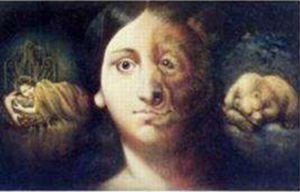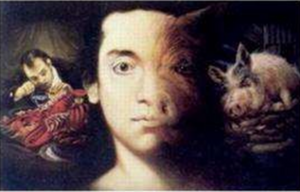Talk:Karm-Phala or Bhoga: The fruit of our Purushakāra:Mental Effects: Svabhāva
By Vishal Agarwal
A closed book containing, say a thousand pages, appears at a first glance as a solid object, but when it is opened, two pages of printed matter become visible. Here, the opening of the book is the specific external cause. Similarly, innumerable vāsanā-s lie stored up in our mind, as it were, in a lump, yet each remaining distinct and separate, any one of which may be revived by a suitable karmāśaya.” [1]
The vāsanā saṃskāra-s from past karmas influence our present nature, abilities, preferences, tendencies, and choices, etc.
Thought molds your character. If you entertain noble thoughts, you will develop a noble character; and if you entertain evil thoughts, you will develop a base character… Thought materializes and becomes an action. If you allow the mind to dwell on good, elevating thoughts, you will do naturally good and laudable actions… Conduct or behavior reveals your character. Conduct also molds your character. Cultivation of good conduct needs rigorous discipline and constant vigilance. You will have to watch every thought, word, and action… Good behavior indicates that you have a refined or polished, disciplined mind and a real, good spiritual culture. The practice of japa, prāṇāyāma, and mauna (or vow of silence) will help you control the impulses.[2]
A modern writer notes the following, which can illustrate the power of vāsanā-s very succinctly:
Sow a thought, and you reap an act; Sow an act; and you reap a habit; Sow a habit, and you reap a character; Sow a character, and you reap a destiny. Samuel Smiles (1812–1904 CE)
How our karmas create character, due to the agglutinative character of these vāsanā saṃskāra-s, is further explained by Swami Vivekānanda:
Just as a large number of small waves create a big wave, the effects of karm accumulate to form tendencies, an aggregation of which in a personality we call character. Man is like a center attracting all the powers of the universe towards himself, fusing them all together and sending out his inner reaction to them as a current – the manifestation of his will, which in common parlance we call his personality or character.[3]
Some citations in this regard from ancient śāstra-s are given below:
Indeed, one becomes good by good karm, and bad by bad karm. Yajurveda, Bṛhadāraṇyaka Upaniṣad 3.2.13
According as one acts, according as one behaves, so does he become. The doer of good becomes good, the doer of evil becomes evil. One becomes virtuous by virtuous action, bad by bad action.Yajurveda, Bṛhadāraṇyaka Upaniṣad 4.4.5
Bad karmas are the cause of bondage. When the effects of these bad karmas are experienced, and are exhausted as a result, and thereafter when the mind and body are purified with good karmas, then that person becomes inclined towards practicing austerities and yog. Mahābhārata 3.209.39
Acts of yajña-s, austerity and charity must not be forsaken, and they must be performed. Yajña-s, austerity, and charity are indeed the purifiers of the wise. Gītā 18.5
A very special case of svabhāva coming into action in the next life is that of the ‘yogabhrasṭa’ as described in the following verses of the Bhagavad Gītā:
Arjuna said:
Kṛṣṇa, he who cannot control himself even though he has faith, whose mind has wandered away from yog, failing to attain perfection in yog, which way does he go? Gītā 6.37
Might-armed, is he not lost like a rent cloud, having fallen from both worlds, without any firm support, confused on the path that leads to Brahman? Gītā 6.38
Kṛṣṇa, you should quell this doubt of mine completely, because there is none other than you who can destroy this doubt. Gītā 6.39
Kṛṣṇa said:
Pārtha, my dear friend, neither in this life nor hereafter is there destruction for him. No one who does good begets misfortune. Gītā 6.40
Attaining the worlds of the meritorious, having dwelt there for very many years, he who has fallen from yog is then reborn in the house of such as are pure and prosperous. Gītā 6.41
Or that person may be reborn in the family of wise yogī-s. Such a birth is indeed very difficult to attain in this world. Gītā 6.42
Joy of the Kurus, there he regains the intellect that he had developed in his former body. And then with this as the starting point, he strives onward once again toward perfection. Gītā 6.43
Due to his prior practice, he is carried on irresistibly. Indeed, he who wishes to know of yog then transcends the sound-Brahman. Gītā 6.44
Through persevering efforts and a controlled mind, the yogin, completely cleansed of all evil, and perfecting himself through many lives, then reaches the supreme goal. Gītā 6.45
Story: The Fisherwoman who couldn’t sleep without Fish
Once, a fisherwoman was a guest in the house of a gardener who raised flowers. She came there with her empty basket, after selling fish in the market, and was asked to sleep in a room where flowers were kept. But, because of the fragrance of the flowers, she couldn’t get to sleep for a long time! She was restless and began to fidget about. Her hostess saw her condition and said, “Hello! Why are you tossing from side to side so restlessly?” The fisherwoman said, “I don’t know, friend. Perhaps the smell of the flowers has been disturbing my sleep. Can you give me my basket? Perhaps, that will put me to sleep.” The basket was brought to her. She sprinkled water on it and set it near her nose. Then she fell sound asleep and snored all night. [4]
References[edit]
- ↑ Swami Hariharananda Aranya. Yoga Philosophy of Patanjali with Bhasvati. University of Calcutta, 2000, Calcutta.p. 657
- ↑ Swami Sivananda. All About Hinduism. The Divine Life Society, 1993, Tehri-Garhwal (Uttarakhand), India.pp. 77-78
- ↑ Swami Tapasyananda. The Four Yogas of Swami Vivekananda. Advaita Ashram, 2010, Kolkata.pp. 1-2
- ↑ Tales and Parables of Sri Ramakrishna. Sri Ramakrishna Math. Mylapore: Madras, Page 24







